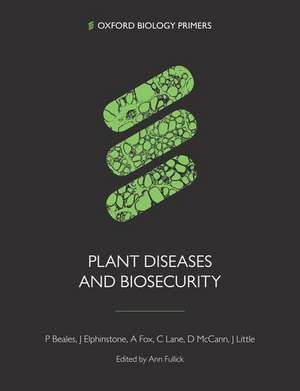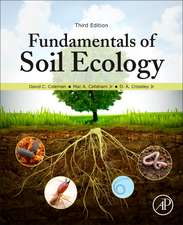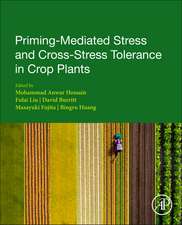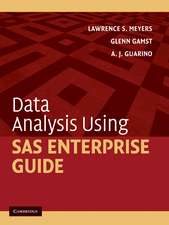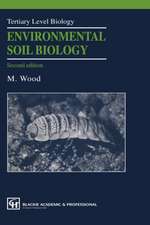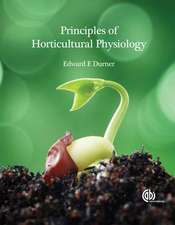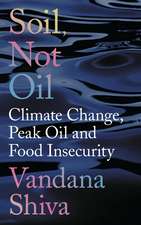Plant Diseases and Biosecurity: Oxford Biology Primers
Autor Paul Beales, John Elphinstone, Adrian Fox, Charles Lane, Derek McCann, Tim Lacey, Julian Little, Kerry Maguire, Alice Turnbullen Limba Engleză Paperback – 5 mar 2019
Din seria Oxford Biology Primers
- 26%
 Preț: 152.73 lei
Preț: 152.73 lei - 20%
 Preț: 152.91 lei
Preț: 152.91 lei - 26%
 Preț: 152.91 lei
Preț: 152.91 lei - 20%
 Preț: 165.91 lei
Preț: 165.91 lei - 20%
 Preț: 164.31 lei
Preț: 164.31 lei - 26%
 Preț: 154.08 lei
Preț: 154.08 lei - 26%
 Preț: 154.50 lei
Preț: 154.50 lei - 20%
 Preț: 165.91 lei
Preț: 165.91 lei - 17%
 Preț: 175.25 lei
Preț: 175.25 lei - 20%
 Preț: 153.39 lei
Preț: 153.39 lei - 14%
 Preț: 165.98 lei
Preț: 165.98 lei - 13%
 Preț: 166.27 lei
Preț: 166.27 lei - 13%
 Preț: 167.59 lei
Preț: 167.59 lei - 20%
 Preț: 154.33 lei
Preț: 154.33 lei - 19%
 Preț: 167.33 lei
Preț: 167.33 lei - 20%
 Preț: 155.13 lei
Preț: 155.13 lei - 13%
 Preț: 153.79 lei
Preț: 153.79 lei - 13%
 Preț: 154.02 lei
Preț: 154.02 lei - 14%
 Preț: 152.42 lei
Preț: 152.42 lei - 13%
 Preț: 166.61 lei
Preț: 166.61 lei - 14%
 Preț: 152.69 lei
Preț: 152.69 lei
Preț: 154.69 lei
Preț vechi: 207.84 lei
-26% Nou
Puncte Express: 232
Preț estimativ în valută:
29.60€ • 30.79$ • 24.44£
29.60€ • 30.79$ • 24.44£
Carte disponibilă
Livrare economică 13-19 martie
Livrare express 08-14 martie pentru 79.20 lei
Preluare comenzi: 021 569.72.76
Specificații
ISBN-13: 9780198827726
ISBN-10: 0198827725
Pagini: 208
Dimensiuni: 189 x 246 x 9 mm
Greutate: 0.42 kg
Editura: OUP OXFORD
Colecția OUP Oxford
Seria Oxford Biology Primers
Locul publicării:Oxford, United Kingdom
ISBN-10: 0198827725
Pagini: 208
Dimensiuni: 189 x 246 x 9 mm
Greutate: 0.42 kg
Editura: OUP OXFORD
Colecția OUP Oxford
Seria Oxford Biology Primers
Locul publicării:Oxford, United Kingdom
Recenzii
The world needs young people to care about plants and to consider studying them after leaving school and these authors have produced an attractive book, written in an accessible style which will hopefully inspire future students to take up this area of academic study.
Notă biografică
Dr Paul Beales grew up in the countryside and had a fascination for biology from an early age. He studied biology in his first degree at Bristol, where he became fascinated with plant diseases, and went on to study a new disease of rhododendrons for his PhD. Following his PhD, Paul joined a government laboratory as a mycology (fungal) diagnostician where he had opportunities to design, develop, and use latest techniques to identify plant pathogens (a kind of forensics for plants), to train plant pathologists around the world, to discover and publish brand new diseases and communicate fungal plant diseases through journals, radio and TV appearances. After 16 years in the lab, Paul moved to work with the UK's PHSI - the front line force that protects our environment through inspection services. Here he plays a big part in raising awareness of plant pests and diseases to everyone from school children to landowners, helping protect our environment for future generations.Dr John Elphinstone specialises in the detection, ecology and control of plant pathogenic bacteria. He has a BSc in Plant Science from Newcastle University and a PhD from Dundee, where he investigated pathways of infection of seed potatoes by bacteria. Following 5 years at the International Potato Centre in Peru, he spent a period at Rothamsted Research before moving to Fera Science Ltd, where he has been based for the last 25 years. John has continued in his role as researcher in plant bacteriology and has regularly consulted with government and the EU on development and implementation of policy on monitoring and eradication of quarantine bacteria. John is a member of the EPPO panel on diagnosis of plant pathogenic bacteria and a founding member of the European Association of Phytobacteriologists. He manages research projects on bacterial pathogens of plants and mushrooms, as well as working on understanding the biological diversity of soils in relation to plant health and productivity.Adrian Fox is the Principal Plant Virologist at Fera Science Ltd. His work includes providing a plant virus diagnostic service and consultancy to the UK Government plant health service. He also conducts scientific research which includes improving virus detection methods, plant virus discovery and virus transmission. Adrian leads a team which has been responsible for discovering and describing dozens of previously unknown plant viruses.Although most of his work is focussed on UK plant biosecurity, he also contributes to projects working on food security in Africa. Adrian really enjoys these projects, where applied plant pathology can make real and immediate improvements to people's lives and livelihoods. Adrian is a member of the International Committee on Plant Virus Epidemiology, and has published more than 30 scientific papers, new disease reports, and book chapters.Dr Charles Lane studied Biology at the University of East Anglia for his first degree, and then completed a PhD in mushroom pathology at Sheffield University. Since then, for over 25 years Charles has worked in plant health and biosecurity, investigating the causes of new and emerging plant health diseases. For example, he was the first person to identify Phytophthora ramorum, the oomycete that causes sudden oak death, in the UK. In his role as a plant health consultant he has worked widely with government, NGOs, industry, voluntary groups and citizens in developing good biosecurity practice and raising awareness of plant health issues. He has also been leading the skills agenda for Defra and the Government Office of Science, developing a new programme of work to inspire the next generation of plant health scientists.Derek McCann studied Agriculture at Plymouth University, moving on to short stints in research and farming. Derek has since spent most of his career helping to hold the line to protect the plants of the UK so that we have food to eat, gardens to enjoy and woods to walk in. He started as a front line inspector in the North West of England before moving onto regional and national roles. As Principal Plant Health & Seeds Inspector Derek currently leads on designing and delivering plant health surveys across the UK. He is also actively involved when notifiable pests & disease outbreaks are discovered in horticulture, agriculture and the wider environment. Whilst we all have a role to play in plant biosecurity, Derek particularly appreciates the trust and responsibility the APHA are given as regulators working for the public good.Dr Tim Lacey has always been interested in agriculture (having grown up on a farm) and particularly in plants. Initially, he followed this aspiration with a degree in Conservation Management, but then entered the world of arable and horticultural crops with a glasshouse research job for a major agrochemical company. Following this, Tim specialised further in horticultural crops with a PhD in irrigating vegetable crops before getting his hands dirty as an agronomist and triallist for several years. Ultimately, this led to his role looking after the specialist fruit, vegetable and biological crop protection products at Bayer a role which gives him great variety, is highly technical, and gives him the chance to talk to all stakeholders in the food chain from growers to agronomists to supermarkets.Dr Julian Little took a degree in Biochemistry at University of Swansea and then a PhD in how plants recognise (and do something about) the fact that they are being attacked by a fungus. He then started working as a plant scientist in Rhône-Poulenc, developing understanding of how weed-killers kill plants. Having worked in France, he returned to the UK as a project leader both in Rhône-Poulenc and then Aventis CropScience. When the latter was bought by Bayer, Julian switched to science communication, and he is currently the Head of Communication and Government Affairs for Bayer Crop Science. Julian has a lifelong fascination with plants and passionately believes that it is possible to produce both high quality affordable food, and promote wildlife in our countryside. He was recently elected Fellow of the Royal Society of Biology.Dr Kerry Maguire was introduced to the exciting world of soil remediation during her industrial placement year at Rothamsted Research (whilst studying for a degree in Plant Science at the University of London). Kerry embarked on her PhD, studying how a fungal pathogen infects wheat at a biochemical and cellular level and was awarded her Doctorate from the University of Nottingham. Kerry stayed at Rothamsted before moving to NIAB TAG Cambridge where she continued to work with cereal killers at a plant rather than a cellular level. She branched out to work with pea and bean pathogens before returning to her love of cereal pathogens. Now she works with scientists, growers and agronomists to reduce the impact of cereal pathogens on crops.Alice Turnbull grew up in a family of scientists and engineers, through which she developed a passion for science communication and the need to connect scientists and others with environmental, food and farming policy. She built on this passion by studying Sociology at the University of Nottingham, exploring the philosophy of science, and topics such as public acceptance of the science behind the climate change debate. After studying for a Masters in International Relations at Warwick University, Alice is delighted to be able to apply her research directly to the real world, working with a range of stakeholders every day on topics such as knowledge exchange, scientific innovation, and the power of plant science in shaping sustainable agricultural policy development.
